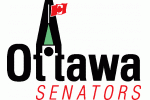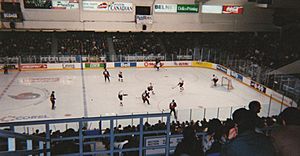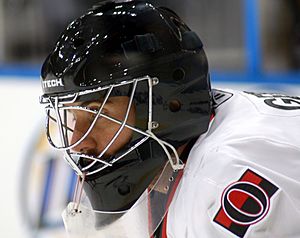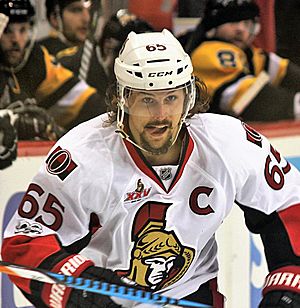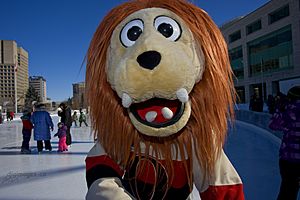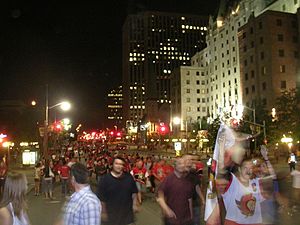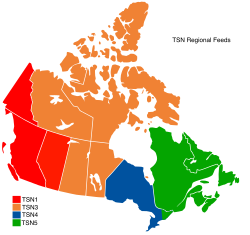Ottawa Senators facts for kids
Quick facts for kids Ottawa SenatorsSénateurs d'Ottawa |
|
|---|---|
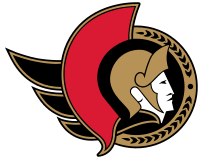 |
|
| Conference | Eastern |
| Division | Atlantic |
| Founded | 1992 |
| History | Ottawa Senators 1992–present |
| Home arena | Canadian Tire Centre |
| City | Ottawa, Ontario |
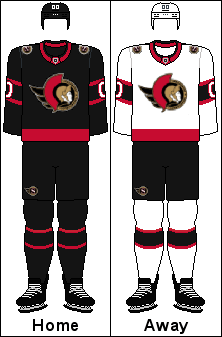 |
|
| Colours | Red, black, white, gold |
| Media |
|
| Owner(s) | Michael Andlauer |
| General manager | Steve Staios |
| Head coach | Travis Green |
| Captain | Brady Tkachuk |
| Minor league affiliates |
|
| Stanley Cups | 0 |
| Conference championships | 1 (2006–07) |
| Presidents' Trophies | 1 (2002–03) |
| Division championships | 4 (1998–99, 2000–01, 2002–03, 2005–06) |
The Ottawa Senators (French: Sénateurs d'Ottawa) are a professional ice hockey team from Ottawa, Canada. People often call them the Sens. They play in the National Hockey League (NHL). The team is part of the Atlantic Division in the Eastern Conference. Their home games are played at the Canadian Tire Centre, which can hold 18,652 fans. It opened in 1996.
The team was started by Ottawa real estate developer Bruce Firestone. It is the second NHL team to use the Ottawa Senators name. The first Ottawa Senators team began in 1883. They won the Stanley Cup 11 times and played in the NHL from 1917 to 1934. On December 6, 1990, the NHL approved a new team for Firestone's group. This new team started playing in the 1992–93 season. The Senators have reached the playoffs 16 times. They have won four division titles and the 2003 Presidents' Trophy. In 2007, they played in the 2007 Stanley Cup Final but lost to the Anaheim Ducks.
Contents
Team History: Bringing Back the Sens
Ottawa used to have a famous hockey team, the original Senators. They were one of the first NHL teams and won the Stanley Cup 11 times. But the original team faced money problems. They had to move to St. Louis in 1934 and became the Eagles. The NHL team was not successful there.
Fifty-four years later, the NHL planned to add new teams. Ottawa developer Bruce Firestone and his friends, Cyril Leeder and Randy Sexton, believed Ottawa could support an NHL team again. Firestone's company, Terrace Investments, didn't have enough money for the expansion fee. So, they came up with a plan to use land development to help pay for it.
In 1989, they found a good spot for a new arena in Kanata, just west of Ottawa. Terrace announced their goal to get a team. They started a "Bring Back the Senators" campaign. This campaign helped get public support and convince the NHL. Many people supported the idea, and over 11,000 season tickets were promised. On December 12, 1990, the NHL approved Firestone's group for a new team. The team started playing in the 1992–93 season.
Starting Out: The Early Years (1992–1996)
The new team hired Mel Bridgman as their first general manager in 1992. He had not managed an NHL team before. Ottawa also hired Rick Bowness as head coach. The Senators played their first game on October 8, 1992, at the Ottawa Civic Centre. They beat the Montreal Canadiens 5–3, which was a big moment.
After that exciting start, the team struggled a lot. They ended up with one of the worst records in the league. They won only 10 games, lost 70, and had four ties. This gave them 24 points. Firestone had set a goal not to break the NHL record for fewest points. So, in a way, the season was seen as a small success. The long-term plan was to finish low in the standings for a few years. This would help them get high draft picks and eventually compete for the Stanley Cup.
Terrace needed a partner to make the final payment to the NHL. Firestone sold half of Terrace to Rod Bryden, a technology executive. Bryden became the main owner of the Senators in August 1993.
Bridgman was fired after one season. Randy Sexton took over as general manager. The team continued to finish last for the next three seasons. They picked talented players like Radek Bonk (1994), Bryan Berard (1995, later traded for Wade Redden), Chris Phillips (1996), and Marian Hossa (1997). These players became important parts of the team. Alexei Yashin, the team's first-ever draft pick from 1992, became a young star.
By the 1995–96 season, fans were getting impatient. Star player Alexei Yashin refused to play because of a contract dispute. Rick Bowness was fired in late 1995 and replaced by Dave Allison. Allison's time as coach was also tough. Sexton was then fired and replaced by Pierre Gauthier.
Before January 1996 ended, Gauthier solved Yashin's contract issue. He also hired Jacques Martin as head coach. Ottawa finished last again, but there was new hope. This was thanks to the new management and coach. Also, a rookie from Sweden, Daniel Alfredsson, emerged. He won the Calder Memorial Trophy as the NHL Rookie of the Year in 1996.
The Jacques Martin Era (1996–2004)
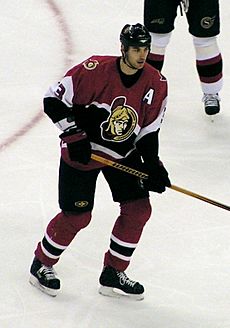
Coach Martin focused on "strong defense first." This helped the team reach the playoffs every season he coached. However, he was criticized because the team often lost in the playoffs. They especially struggled against their rival, the Toronto Maple Leafs.
In the 1996–97 season, the team made the playoffs in their very last game. They almost beat the Buffalo Sabres in the first round. In 1997–98, they had their first winning record. They surprised the New Jersey Devils to win their first playoff series. But they lost in the second round to the Washington Capitals.
The 1998–99 season saw the Senators jump to third overall in the league. They earned 103 points, their first time getting over 100 points. But they were swept by the Sabres in the first round. In 1999–2000, even with captain Alexei Yashin holding out, Martin led the team to the playoffs. They lost to the Maple Leafs in the first "Battle of Ontario" playoff series.
Yashin returned for the 2000–01 season. The team improved, winning their division and finishing second in the Eastern Conference. Yashin played poorly in another first-round playoff loss. On the day of the 2001 NHL entry draft, he was traded to the New York Islanders. In return, Ottawa got Zdeno Chara, Bill Muckalt, and the second overall draft pick. Ottawa used that pick to choose center Jason Spezza.
The 2001–02 Senators had fewer regular season points. But in the playoffs, they beat the Philadelphia Flyers for their second playoff series win. They pushed their second-round series to seven games. However, they lost again to the Maple Leafs. General manager Marshall Johnston retired and was replaced by John Muckler.
The Senators faced financial problems but kept playing in the 2002–03 season. Despite these issues, Ottawa had an amazing season. They finished first overall in the NHL, winning the Presidents' Trophy. In the playoffs, they almost reached the Stanley Cup Finals. They lost to the New Jersey Devils, who went on to win the Stanley Cup. In 2003–04, Martin led the team to another good regular season. But they lost in the first round of the playoffs to the Maple Leafs again. This led to Martin being fired, as management wanted a new coach for playoff success.
New Ownership: Eugene Melnyk Buys the Team
In 2000, owner Rod Bryden asked the Canadian government for tax help for all Canadian NHL teams. This was because the Canadian dollar had dropped a lot. His request for tax relief was later canceled. In 2002, Bryden announced he would sell the club.
In January 2003, the Senators went into bankruptcy protection. They owed a lot of money for the club and the arena. A deal to sell the team fell through in 2003.
In August 2003, Eugene Melnyk, a billionaire from the pharmaceutical industry, bought the club for about $130 million CAD. Melnyk became the sole owner of the team and the arena.
The Bryan Murray Era (2004–2016)
After the playoff loss in 2004, owner Melnyk promised changes. In June 2004, Bryan Murray became the head coach. That summer, the team made big changes to its players. They traded long-time players Patrick Lalime and Radek Bonk. They also signed star goalie Dominik Hasek. The team couldn't show off its new players for a year because of the 2004–05 NHL lock-out. Most players played in Europe or minor leagues during this time. Just before the 2005–06 season, the team traded long-time player Marian Hossa for Dany Heatley.
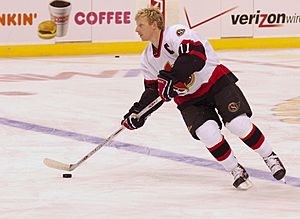
Many people thought the Senators would be Stanley Cup contenders in 2005–06. They had many strong players returning. The team started very well, winning 19 of their first 22 games. They finished the season with 52 wins and 113 points. This placed them first in their conference and second overall. The new 'CASH' line of Alfredsson, Spezza, and Heatley became one of the league's best scoring lines. Hasek played well until he got injured during the 2006 Winter Olympics. This meant rookie goalie Ray Emery had to start in the playoffs. Without Hasek, the team lost in the second round to the Buffalo Sabres.
In 2006–07, the Senators reached the Stanley Cup Final. They had made the playoffs for nine seasons in a row. The team had many new players and wanted to overcome the disappointment of 2006. They started the season slowly. There were even rumors about trading Daniel Alfredsson. But the team improved and finished fourth in the Eastern Conference. They had 105 points, their fourth straight season with over 100 points.
In the playoffs, Ottawa continued to play well. The 'CASH' line, goalie Ray Emery, and strong defense from Chris Phillips and Anton Volchenkov led the way. The team beat the Pittsburgh Penguins, the New Jersey Devils, and the Sabres. This sent them to the Stanley Cup Final.
The 2006–07 Senators were the first Ottawa team to reach the Stanley Cup Final since 1927. The city was very excited. Businesses put up "Go Sens Go" signs. People decorated their homes and cars. A large Senators flag was hung on City Hall. A huge picture of Daniel Alfredsson was put on a building. Rallies were held, and a part of downtown, called the "Sens Mile," was closed for fans to gather.
In the Stanley Cup Final, the Senators played the Anaheim Ducks. The Ducks were known for their strong defense. The Ducks won the first two games in Anaheim. The Senators won game three at home but lost game four. The Ducks won game five in Anaheim to win the series and their first Stanley Cup. The Ducks' defense was too strong for the 'CASH' line. The Ducks also scored important goals, and their goalie, Jean-Sebastien Giguere, played better than Emery.
After the Stanley Cup Final, Bryan Murray's contract was ending. General manager John Muckler was expected to retire. Owner Melnyk decided to make Murray the new general manager. Muckler declined another position and left the team. Murray then made John Paddock the head coach. The team started the 2007–08 season very well under Paddock. However, their play declined, and Paddock was fired. Murray took over as coach temporarily. The team made the playoffs but was swept by the Pittsburgh Penguins. In June, goalie Ray Emery was let go because of off-ice issues.
For 2008–09, Murray hired Craig Hartsburg to coach. The Senators struggled under Hartsburg. Goaltending was inconsistent with Martin Gerber and Alex Auld. Murray fired Hartsburg in February 2009. Cory Clouston became the new coach. The team played better under Clouston. Rookie goalie Brian Elliott also played well. The team missed the playoffs for the first time in 12 seasons.
Clouston's coaching caused problems with star player Dany Heatley. Heatley asked to be traded and was sent to the San Jose Sharks before the 2009–10 season.
In 2009–10, the Senators were an average team until January. Then, they went on a team-record 11-game winning streak. This moved them to the top of their division. They qualified for the playoffs in fifth place. For the third time in four seasons, they played the Pittsburgh Penguins in the first round. The Senators won a triple-overtime game in Pittsburgh. But they couldn't win a playoff game at home and lost the series in six games.
The Senators had a much worse 2010–11 season than expected. There were constant rumors of big changes. Owner Melnyk said he would not fire Clouston or Murray. He said he was planning for the future. Murray then traded several veteran players for draft picks.
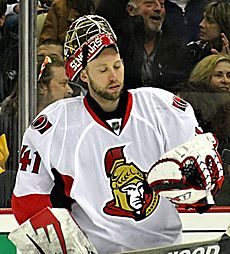
Murray traded Mike Fisher to Nashville. He also traded Chris Kelly and Jarkko Ruutu. A trade with the Colorado Avalanche brought Craig Anderson to Ottawa. Anderson played very well, and the team signed him to a four-year contract. Murray was re-signed as general manager. On April 9, coach Cory Clouston was fired. Former Detroit Red Wings assistant coach Paul MacLean was hired as the new coach on June 14, 2011.
At the start of the 2011–12 season, many experts thought the Senators would finish last. The team had many young players. They struggled at first but then won six games in a row. In December 2011, they got forward Kyle Turris from the Phoenix Coyotes. The team improved and moved into a playoff spot. Ottawa hosted the NHL All-Star Game for the first time, which was a big success. Five Senators players were chosen for the event, including Daniel Alfredsson, who was a captain.
When starting goalie Craig Anderson injured his hand, the Senators called up Robin Lehner and got goalie Ben Bishop from the St. Louis Blues. The team kept playing well and finished eighth in the Eastern Conference. They played the New York Rangers in the first round and lost in seven games.
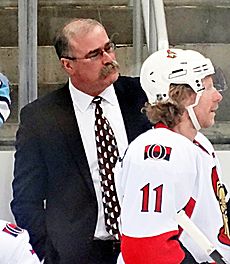
The next season was tough due to injuries to key players like Erik Karlsson, Jason Spezza, Milan Michalek, and Craig Anderson. Despite this, the Senators finished seventh in the Eastern Conference. Coach Paul MacLean won the Jack Adams Award as the NHL's coach of the year. In a rivalry series, Ottawa beat the Montreal Canadiens in five games in the first round. This was the first playoff series between the two cities' teams since 1927. The Senators then lost to the Pittsburgh Penguins in five games in the second round.
July 5, 2013, was a sad day for fans. Long-time captain Daniel Alfredsson signed with the Detroit Red Wings. He left Ottawa after 17 seasons and 14 as captain. This shocked many fans. However, the day ended with good news. Murray acquired star forward Bobby Ryan from the Anaheim Ducks. He also signed Clarke MacArthur and brought back Joe Corvo.
For the 2013–14 season, the league changed its divisions. Ottawa was now in the new Atlantic Division. On September 14, 2013, Jason Spezza was named the team's eighth captain. Ryan and Spezza struggled to play well together. The team was outside of a playoff spot. Murray traded for Ales Hemsky from the Edmonton Oilers. But the team missed the playoffs. Hemsky left as a free agent. Spezza also asked to be traded and was sent to the Dallas Stars. This ended an era for the stars of the 2007 Stanley Cup Finals team.
At the start of the 2014–15 season, Erik Karlsson became the team's ninth captain. The club signed Ryan to a long contract. After a slow start, the Senators fired coach Paul MacLean. Assistant coach Dave Cameron took over. This change helped the team. They won 32 of their last 55 games. When both Senators' goalies were injured, Andrew Hammond from Binghamton stepped in. Hammond, nicknamed 'The Hamburglar,' had an amazing record. He helped the team get back into a playoff spot. The Senators became the first team in modern NHL history to come back from a 14-point deficit to make the playoffs. However, they lost to the Canadiens in six games in the first round.
During the 2014–15 season, it was announced that Murray had cancer. He continued as general manager through the 2015–16 season. The Senators had the best record of any Canadian team but missed the playoffs. Murray made a big trade, bringing Toronto Maple Leafs' captain Dion Phaneuf to the Senators. The team played well after the trade but still missed the playoffs.
The Pierre Dorion Era (2016–2023)
On April 10, 2016, Murray resigned as general manager but stayed as an advisor. Assistant general manager Pierre Dorion was promoted. On April 12, 2016, coach Dave Cameron was fired. On May 8, 2016, the Senators hired Guy Boucher as their new head coach. Marc Crawford became the associate coach. Daniel Alfredsson was hired as a senior advisor.
The Senators finished second in their division in the 2016–17 season. They beat the Boston Bruins in six games in the first round of the playoffs. In the second round, they defeated the New York Rangers in six games. Jean-Gabriel Pageau scored four goals in one game, including the winning goal in double overtime. The Senators came very close to the Stanley Cup Finals. They lost in double overtime of game seven of their conference finals series against the Pittsburgh Penguins. The Penguins went on to win their second straight Stanley Cup.
After reaching the conference finals, the Senators lost defenseman Marc Methot in the 2017 NHL expansion draft. On November 5, 2017, the Senators made a big trade with the Colorado Avalanche. They brought in star forward Matt Duchene in exchange for Kyle Turris and other players and draft picks. After the trade, the Senators' season started to fall apart.
A highlight of the season was hosting the NHL 100 Classic game outdoors at TD Place Stadium. They played against the Montreal Canadiens. The game celebrated 100 years since the first Montreal-Ottawa NHL game. The Senators won 3–0. However, owner Melnyk made controversial comments about attendance and possibly selling or moving the team. The Senators were out of the playoff picture. They traded veteran players like Derick Brassard and Dion Phaneuf. The Senators finished second-to-last in the league.
In 2018, the Senators began a complete team rebuild. They traded forward Mike Hoffman. The Senators had the fourth overall pick in the 2018 draft. They chose to keep the pick and selected forward Brady Tkachuk. Just before the season started, the Senators traded their captain, Erik Karlsson, to the San Jose Sharks.
The 2018–19 season started poorly. The Senators could not re-sign forwards Matt Duchene, Mark Stone, and Ryan Dzingel. Owner Melnyk famously said the team would be "all-in" for a five-year run of success. All three players were traded before the 2019 trade deadline. Duchene and Dzingel went to the Columbus Blue Jackets. Mark Stone was traded to the Vegas Golden Knights.
Days after trading their top scorers, plans for a new downtown arena fell through. The team finished last in the NHL. This was the first time since 1995–96 that the Senators missed the playoffs two seasons in a row.
Before the 2019–20 season, D. J. Smith was hired as the new head coach. The team focused on developing its young players. The season was cut short by the COVID-19 pandemic. The Senators finished second-last in the NHL. However, their farm team, the Belleville Senators, had a great season. This team included top prospects like Josh Norris, Drake Batherson, Alex Formenton, and Erik Brannstrom. The San Jose Sharks had a bad year, which helped the Senators. Ottawa had the third and fifth picks in the 2020 NHL draft. They used them to select Tim Stutzle and Jake Sanderson.
The Senators missed the playoffs again in the 2020–21 season. This season was affected by the COVID-19 pandemic. The young team had a poor start but finished strong, giving fans hope. The Senators traded veteran players for draft picks again.
Before the 2021–22 season, general manager Pierre Dorion's contract was extended. He said, "The rebuild is done." But the Senators started slowly and quickly fell out of the playoff race. On October 17, 2021, Brady Tkachuk signed a seven-year deal. Three weeks later, he was named the 10th captain in team history at just 22 years old. Tkachuk was the team's youngest-ever captain at that time.
Before the 2022–23 season, the team tried hard to end their rebuild. They acquired forwards Alex DeBrincat and Claude Giroux and goalie Cam Talbot. They also signed Josh Norris and Tim Stutzle to long contracts. At the end of the season, the Senators missed the playoffs by six points.
Before the 2023–24 season, DeBrincat was traded to Detroit. Talbot was not re-signed. The Senators signed free agents Joonas Korpisalo and Vladimir Tarasenko. At the start of the 2023–24 season, the NHL took away a first-round draft pick from the Senators. This was because of a mistake involving a trade of Evgeni Dadonov. Dorion resigned as general manager. After a tough start to the season, D. J. Smith was fired on December 18, 2023. Former head coach Jacques Martin became the interim coach.
New Ownership and Playoff Return (2024–25)
Owner Eugene Melnyk passed away in March 2022. He had said he planned to leave the team to his daughters. In November 2022, the team began looking for a buyer. The Senators confirmed the sale plan, with the condition that the team must stay in Ottawa. On June 13, 2023, the Senators announced a purchase agreement with a group led by Michael Andlauer. Andlauer became the majority owner on September 21, 2023, along with Melnyk's daughters and other Canadian businessmen.
After Andlauer took over, he made changes. Cyril Leeder, a former CEO, returned in September 2023. On September 29, former player Steve Staios was named president of hockey operations. After Dorion resigned, Staios became interim general manager. Staios was later named permanent general manager. Another former NHL player, Dave Poulin, became senior vice president of hockey operations.
During the off-season after the 2023–24 season, the Senators hired former Canucks/Devils head coach Travis Green. Green's first season started slowly. By mid-season 2024–25, the team was near the bottom of the league. However, the team improved as the season went on. They clinched their first playoff spot, ending an eight-year drought. Green became the first head coach to lead the Senators to the postseason since the 2016–17 season.
Team Rivalries
Battle of Ontario: Toronto Maple Leafs
The "Battle of Ontario" is a big rivalry with the Toronto Maple Leafs. It's a modern version of an old rivalry between Ottawa, Canada's capital, and Toronto, its largest city. Both teams play in the same division, so they play each other often. In the early 2000s, the teams met four times in a row in the playoffs. Toronto won all four series.
As of the end of the 2024–25 season, Ottawa has won more regular season games (76 wins to Toronto's 55). But Toronto leads in playoff wins (20 to Ottawa's 10).
Ottawa vs. Montreal Canadiens
There's a long-standing rivalry between Ottawa and Montreal in many sports, including hockey. Today, both teams are in the Atlantic Division. It's only a two-hour drive between the cities. When the teams play in Ottawa, many Canadiens fans come to the games. The current rivalry started when the Senators played their first NHL game on October 8, 1992. The new Senators beat the Montreal Canadiens 5–3. That win was one of the few highlights of their first season. The Canadiens went on to win their 24th Stanley Cup that season.
Another big game in this rivalry was the NHL 100 Classic in December 2017. It was played outdoors in Ottawa. This game celebrated 100 years since the first NHL game between the original Senators and the Canadiens.
The rivalry grew even before the teams met in the playoffs. Senators captain Daniel Alfredsson hoped for a playoff series between them. This finally happened in 2013. That series had many controversial moments. In game one, Ottawa's Eric Gryba hit Montreal's Lars Eller. After the game, Senators coach Paul MacLean blamed another player for a bad pass. Canadiens coach Michel Therrien said MacLean showed "a lack of respect." Ottawa won that game 4–2.
Two years later, the rivalry continued in another playoff series in 2015. In game one, Montreal's P. K. Subban hit Ottawa's Mark Stone, breaking his wrist. Subban was ejected. Senators coach Dave Cameron called the hit "vicious." The Canadiens won that game 4–3. The Canadiens won the next two games in overtime. They led the series 3–0. Ottawa won the next two games, but Montreal closed out the series in game six.
As of the end of the 2024–25 season, Montreal leads the regular season series against the current Ottawa Senators (82 wins to Ottawa's 73). Ottawa leads 6–5 in the playoff record.
Past Rivalry: Buffalo Sabres (1992–2008)
The Sabres and Senators had a strong rivalry after the 2004–05 NHL lockout. Both teams were competing for the Northeast Division title. Ottawa usually won against Buffalo in regular season games. But Buffalo often beat them in the playoffs. A famous game in this rivalry happened on February 22, 2007. It included a big fight with both goalies involved.
The teams met four times in the playoffs: in 1997, 1999, 2006, and 2007. Buffalo won three of these series, and Ottawa won one. Ottawa also beat Buffalo in the last game of the 1996–97 season to make the playoffs for the first time. This rivalry has faded as both teams have struggled at different times. However, they are still in the same division, so the rivalry could start up again.
As of the end of the 2024–25 season, Buffalo leads the regular season record (71 wins to Ottawa's 63). Buffalo also leads 13–8 in playoff games.
Team Arenas
Ottawa Civic Centre: First Home (1992–1996)
The Senators' first home arena was the Ottawa Civic Centre. It is now called TD Place Arena. They played there from the 1992–93 season until January 1996. The arena was used by the junior Ottawa 67's. It was updated for the Senators, with new press boxes and luxury suites. Their first home game was on October 8, 1992, against the Montreal Canadiens. The Senators won 5–3. Their last game there was on December 31, 1995.
Canadian Tire Centre: Current Home (1996–Present)
As part of the plan to get an NHL team for Ottawa, Terrace Corporation proposed building a new arena in September 1989. The plan included a hotel and a 20,500-seat arena called The Palladium. The arena was to be surrounded by a small city called "West Terrace." The land for the arena was bought in 1987. Approval for the zoning was given in August 1991. Construction started on July 7, 1994, and took 18 months to finish.
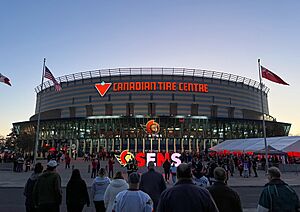
The Palladium opened on January 15, 1996, with a concert. The Senators played their first game there two days later, losing to the Montreal Canadiens. On February 17, 1996, the arena's name changed to 'Corel Centre'. This was because Corel Corporation, an Ottawa software company, signed a 20-year naming rights deal.
In 2003, Eugene Melnyk bought the Senators and the arena. The arena and club became fully owned by Melnyk's new company. In 2004, the seating capacity was increased to 19,153.
On January 19, 2006, the arena became 'Scotiabank Place'. This was after Melnyk made a new 15-year naming deal with Scotiabank. On June 18, 2013, the Senators and Scotiabank ended their deal. The arena was renamed Canadian Tire Centre on July 1, 2013, after a new agreement with Canadian Tire.
Future Plans: Downtown Arena Proposal
In 2015, the National Capital Commission (NCC) asked for ideas to redevelop the LeBreton Flats area in downtown Ottawa. This area had been empty for a long time. In 2016, the NCC chose a plan from Senators owner Eugene Melnyk and his partners. The plan included homes, parks, a recreation center, a library, and a new arena for the Senators.
The plan for a new downtown arena fell apart in late 2018. It was revealed that the Senators were suing their partners. The NCC canceled the partnership's bid. However, they gave the groups more time to try and reach an agreement. On February 27, 2019, it was announced that they could not agree. The NCC would look for other options for the site.
The NCC restarted the process to redevelop the area. They asked for bids for the arena site separately. In June 2022, the NCC announced that the Senators' proposal had been chosen for the site. A lease agreement was expected by autumn 2023.
Practice Facility: Bell Sensplex
The Senators practice at the Bell Sensplex. This facility cost $25.6 million CAD. It has three NHL-sized rinks, an Olympic-sized rink, and a fieldhouse. It opened in 2004. The Bell Sensplex is used for Senators practices, minor hockey, and the annual Bell Capital Cup tournament.
Team Identity
The Senators team is in a city where both English and French are spoken. The team provides services and marketing in both languages. A bilingual version of the Canadian anthem is sung before home games. All announcements are in both English and French.
Logo and Jersey Design
The team colors are black, red, and white, with gold trim. These colors are similar to the original Senators' colors. The team's home jersey is black with red trim. The away jersey is white with black and red trim. The team's logo shows the head of a Roman general. This general was a member of the Senate in ancient Rome. The original logo, revealed in 1991, showed a "strong and prominent" centurion figure.
From 1992 to 1995, the Senators' road jerseys were black with red stripes. White stripes were added in 1995. In 1997, the Senators showed a red third jersey. It had a new "forward-facing" centurion logo. This jersey became the team's main dark jersey in 1999.
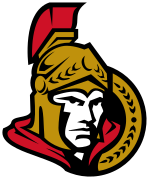
A new jersey design was revealed on August 22, 2007. It included the original Senators' 'O' logo as a shoulder patch. The main logo was updated. Before the 2008–09 season, the Senators showed a new black third jersey. It had the shortened "SENS" name on the front.
In 2011, the Senators introduced a throwback-inspired third jersey. It was mostly black with stripes that looked like the original Senators' 'barber-pole' designs. Shield-like patches were added to the shoulders. These patches spelled the team name in English and French.
In 2020, the Senators brought back their 1997–2007 logo. The updated logo uses a gold outline. The new uniforms look a lot like the original ones from the 1990s. The Senators also showed a "Reverse Retro" alternate uniform. It was based on the original 1992–93 uniform but with red as the main color. In the 2022–23 season, the Senators wore "Reverse Retro" uniforms based on their alternates from 1997 to 2007.
Arena Entertainment
At many home games, fans are entertained both inside and outside the Canadian Tire Centre. There is live music, DJs, giveaways, and promotions. The 'Sons of Scotland Pipe Band' plays traditional Scottish music. Before and during games, Spartacat, the official mascot, entertains fans. He is a lion-like character and first appeared on October 8, 1992.
During breaks in the game, there are on-ice contests, youth games, and t-shirt giveaways. At each game, a fan gets to ride one of the ice-resurfacing machines (Zambonis). The team's public address announcer is Jonathan Trottier. Their in-game DJ is Alexis Marchand. After each Senators' goal, a special goal horn sounds. At each game, the Senators honor a Canadian veteran soldier.
Like other NHL arenas in Canada, O Canada is sung before the game. The Star-Spangled Banner is also sung if an American team is visiting. O Canada is sung in both English and French. From 1994 to 2016, Lyndon Slewidge sang the anthems. Now, the team does not have a regular singer. During O Canada, a large Canadian flag is passed around by fans.
The Senators have their own theme song called Trumpeters Cry. It is played when the team comes onto the ice. The song was written by Ottawa singer-songwriter Andres del Castillo.
Fan Support and the Sens Army
The Senators' fans are known as the Sens Army. Like many hockey fans, they often dress up for games. Some wear Roman legionary clothing. During the 2006–07 playoff run, many fans wore red. Fan activities included 'Red Rallies' with decorated cars. There were also fan rallies at Ottawa City Hall Plaza. The 'Sens Mile' on Elgin Street was a place where fans gathered.
The Sens Mile
During the 2007 playoffs, Senators fans celebrated their team's success in the streets. This was similar to what happened in Calgary and Edmonton in previous years. The idea for a 'Sens Mile' on downtown Elgin Street started on Facebook. Elgin Street has many restaurants and pubs. After a playoff win, Ottawa residents closed the street for a spontaneous celebration. The City of Ottawa then closed Elgin Street for each game of the Stanley Cup Finals.
Season-by-Season Performance
This is a partial list of the last five seasons completed by the Senators. For the full season-by-season history, see List of Ottawa Senators seasons
Note: GP = Games Played, W = Wins, L = Losses, OTL = Overtime Losses, Pts = Points, GF = Goals for, GA = Goals against, PIM = Penalties in minutes
| Season | GP | W | L | OTL | Pts | GF | GA | Finish | Playoffs |
| 2020–21 | 56 | 23 | 28 | 5 | 51 | 157 | 190 | 6th, North | Did not qualify |
| 2021–22 | 82 | 33 | 42 | 7 | 73 | 227 | 266 | 7th, Atlantic | Did not qualify |
| 2022–23 | 82 | 39 | 35 | 8 | 86 | 261 | 271 | 6th, Atlantic | Did not qualify |
| 2023–24 | 82 | 37 | 41 | 4 | 78 | 255 | 281 | 7th, Atlantic | Did not qualify |
| 2024–25 | 82 | 45 | 30 | 7 | 97 | 243 | 234 | 4th, Atlantic | Lost in first round, 2–4 (Maple Leafs) |
Players and Team Staff
Current Roster
Updated January 2, 2023
| # | Nat | Player | Pos | S/G | Age | Acquired | Birthplace |
|---|---|---|---|---|---|---|---|
| 19 | Drake Batherson | RW | R | 27 | 2017 | Fort Wayne, Indiana | |
| 26 | Erik Brannstrom | D | L | 26 | 2019 | Eksjö, Sweden | |
| 61 | Derick Brassard | C | L | 38 | 2022 | Hull, Quebec | |
| 72 | Thomas Chabot (A) | D | L | 29 | 2015 | Sainte-Marie, Quebec | |
| 67 | Rourke Chartier |
C | L | 29 | 2022 | Saskatoon, Saskatchewan | |
| 12 | Alex DeBrincat | LW | R | 28 | 2022 | Farmington Hills, Michigan | |
| 31 | Anton Forsberg | G | L | 33 | 2021 | Härnösand, Sweden | |
| 27 | Dylan Gambrell | C/RW | R | 29 | 2021 | Bonney Lake, Washington | |
| 28 | Claude Giroux (A) | RW | R | 38 | 2022 | Hearst, Ontario | |
| 23 | Travis Hamonic | D | R | 35 | 2022 | St. Malo, Manitoba | |
| 5 | Nick Holden | D | L | 38 | 2021 | St. Albert, Alberta | |
| 21 | Mathieu Joseph |
RW | L | 29 | 2022 | Laval, Quebec | |
| 47 | Mark Kastelic | C | R | 26 | 2019 | Phoenix, Arizona | |
| 45 | Parker Kelly | C | L | 26 | 2021 | Camrose, Alberta | |
| 36 | Jake Lucchini | C | L | 30 | 2022 | Trail, British Columbia | |
| 14 | Tyler Motte |
C/LW | L | 30 | 2022 | Port Huron, Michigan | |
| 9 | Josh Norris |
C | L | 26 | 2018 | Oxford, Michigan | |
| 57 | Shane Pinto | C | R | 25 | 2019 | Franklin Square, New York | |
| 85 | Jake Sanderson | D | L | 23 | 2020 | Whitefish, Montana | |
| 18 | Tim Stuetzle | LW | L | 24 | 2020 | Viersen, Germany | |
| 33 | Cam Talbot | G | L | 38 | 2022 | Caledonia, Ontario | |
| 7 | Brady Tkachuk (C) | LW | L | 26 | 2018 | Scottsdale, Arizona | |
| 16 | Austin Watson | RW | R | 34 | 2020 | Ann Arbor, Michigan | |
| 22 | Nikita Zaitsev |
D | R | 34 | 2019 | Moscow, Soviet Union | |
| 2 | Artyom Zub | D | R | 30 | 2020 | Khabarovsk, Russia |
Team Captains
- Laurie Boschman, 1992–1993
- Mark Lamb and Brad Shaw, 1993–1994 (co-captains)
- Gord Dineen, 1994
- Randy Cunneyworth, 1995–1998
- Alexei Yashin, 1998–1999
- Daniel Alfredsson, 1999–2013
- Jason Spezza, 2013–2014
- Erik Karlsson, 2014–2018
- Brady Tkachuk, 2021–present
Head Coaches
- Rick Bowness, 1992–1996
- Dave Allison, 1996
- Jacques Martin, 1996–2004
- Roger Neilson, 2002
- Bryan Murray, 2005–2008
- John Paddock, 2007–2008
- Craig Hartsburg, 2008–2009
- Cory Clouston, 2009–2011
- Paul MacLean, 2011–2014
- Dave Cameron, 2014–2016
- Guy Boucher, 2016–2019
- Marc Crawford, 2019
- D. J. Smith, 2019–2023
- Jacques Martin, 2023–2024
- Travis Green, 2024–present
General Managers
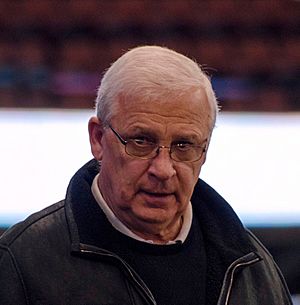
- Mel Bridgman, 1991–1993
- Randy Sexton, 1993–1995
- Pierre Gauthier, 1995–1998
- Rick Dudley, 1998–1999
- Marshall Johnston, 1999–2002
- John Muckler, 2002–2007
- Bryan Murray, 2007–2016
- Pierre Dorion, 2016–2023
- Steve Staios, 2023–present
Source: Ottawa Senators 2009–10 Media Guide, p. 206.
Honored Members
Hockey Hall of Fame
- Daniel Alfredsson – Senators winger (1995–2013) was added in 2022 for his great career.
- Tom Barrasso – Senators' goaltender (2000) was added in 2023 for his career as a goalie.
- Zdeno Chara – Senators' defenseman (2001–2006) was added in 2025 for his career as a defenseman.
- Dominik Hasek – Senators' goaltender (2005–2006) was added in 2014 for his career as a goalie.
- Marian Hossa – Senators' winger (1998–2004) was added in 2020 (ceremony in 2021) for his career as a forward.
- Roger Neilson – Senators' assistant coach and head coach (2001–2003) was added (as a builder) on November 4, 2002, for his coaching career.
Retired Numbers
The Senators have retired the numbers of four players. The NHL retired Wayne Gretzky's No. 99 for all its teams in 2000.
| No. | Player | Position | Career | Date of retirement |
|---|---|---|---|---|
| 4 | Chris Phillips | D | 1997–2015 | February 18, 2020 |
| 8 | Frank Finnigan | RW | 1923–1931 1932–1934 |
October 8, 1992 |
| 11 | Daniel Alfredsson | RW | 1995–2013 | December 29, 2016 |
| 25 | Chris Neil | RW | 2001–2017 | February 17, 2023 |
Ring of Honour
- Bryan Murray – Senators' head coach (2005–2008) and general manager (2007–2016).
- Wade Redden – Senators' defenseman (1996–2008) and alternate captain (1999–2008).
- Donald Chow – Senators' physician (1992–present) and head physician (2002–2017).
Awards and Trophies
NHL Plus-Minus Award
- Wade Redden: 2005–06 (shared with Michal Rozsival of the New York Rangers)
King Clancy Memorial Trophy
Mark Messier Leadership Award
Bill Masterton Memorial Trophy
- Craig Anderson: 2016–17
- Bobby Ryan: 2019–20
NHL All-Rookie Team
- Daniel Alfredsson: 1995–96
- Sami Salo: 1998–99
- Marian Hossa: 1998–99
- Martin Havlat: 2000–01
- Andrej Meszaros: 2005–06
- Mark Stone: 2014–15
- Brady Tkachuk: 2018–19
- Josh Norris: 2020–21
- Jake Sanderson: 2022–23
NHL Second All-Star Team
Team Records
Top Scorers in Team History
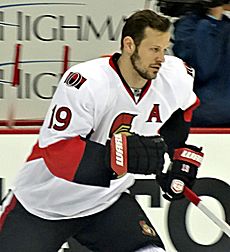
These are the top 10 players with the most points in regular season games for the Senators. Numbers are updated after each NHL regular season.
Note: Pos = Position; GP = Games played; G = Goals; A = Assists; Pts = Points; P/G = Points per game average
- * – current Senators player
|
|
|
Source: Ottawa Senators Media Guide
Team Records for a Season
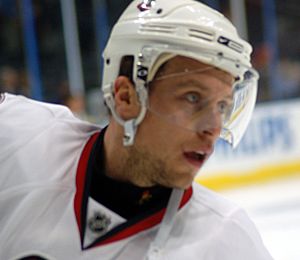
- Most goals in a season – Dany Heatley, 50 (2005–06, 2006–07)
- Most goals in a season by a defenseman – Erik Karlsson, 21 (2014–15)
- Most assists in a season – Jason Spezza, 71 (2005–06)
- Most assists in a season by a defenseman – Erik Karlsson, 66 (2015–16)
- Most points in a season – Dany Heatley, 105 (2006–07)
- Most points in a season by a defenseman – Erik Karlsson, 82 (2015–16)
- Most points in a season by a rookie – Alexei Yashin, 79 (1993–94)
- Most penalty minutes in a season – Mike Peluso, 318 (1992–93)
- Highest +/– rating in a season – Daniel Alfredsson, +42 (2006–07)
- Most games played – Chris Phillips, 1,179 (up to 2022–23 season)
- Most playoff games played – Daniel Alfredsson, 121 (1997–2013)
- Most goaltender wins in a season – Patrick Lalime, 39 (2002–2003)
- Most shutouts in a season – Patrick Lalime, 8 (2002–03)
- Lowest GAA in a season – Craig Anderson, 1.69 (2012–13)
- Best save percentage in a season – Craig Anderson, .941 (2012–13)
Source: Ottawa Senators.
Broadcasting Games
Ottawa Senators games are broadcast in both English and French. Since the 2014–15 season, Bell Media has held the rights to regional TV broadcasts. Games are shown in English on TSN5 and in French on RDS. These broadcasts cover the Ottawa River valley, Eastern Ontario, Quebec, and the Maritime provinces.
On radio, all home and away games are broadcast on a five-station network. This network covers Eastern Ontario and includes one American station, WQTK in Ogdensburg, New York. The main radio station is CFGO in Ottawa. Radio broadcasts on CFGO started in 1997–98. The contract has been extended through the 2025–2026 season. Senators games are also broadcast in French on radio through Intersport Production and CJFO-FM in Ottawa. Nicolas St. Pierre does the play-by-play, and Alain Sanscartier is the color commentator.
Before the 2014–15 season, Sportsnet East held the English regional rights. Dean Brown, who had called Senators games since the team started, moved to the Senators' radio broadcasts. He joined Gord Wilson. Gord Miller and Chris Cuthbert became the Senators' TV voices on TSN from 2014 to 2020. After Cuthbert joined Sportsnet in 2020, Jon Abbott took over as the secondary play-by-play commentator. Mike Johnson became an alternate color commentator. After Abbott left in 2024, Matt Cullen and Kenzie Lalonde shared duties as backup to Miller.
Some games were only available on pay-per-view or in local movie theaters in the past. This "Sens TV" service was stopped in 2008. In 2010, Sportsnet launched a secondary channel for some Senators games. Selected Senators games were also broadcast in French by RDS and TVA Sports.
See also
 In Spanish: Ottawa Senators para niños
In Spanish: Ottawa Senators para niños
- Bell Sensplex
- List of Ottawa Senators players
- List of Ottawa Senators draft picks
- List of NHL players
- List of NHL seasons
- List of ice hockey teams in Ontario
- Lyndon Slewidge
 | Jackie Robinson |
 | Jack Johnson |
 | Althea Gibson |
 | Arthur Ashe |
 | Muhammad Ali |


